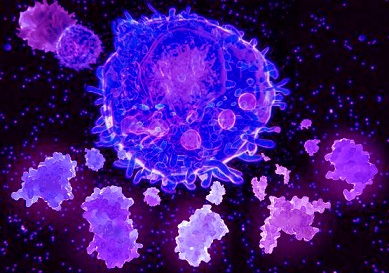New study highlights key inflammatory markers CCL2 and CCR2 in COVID-19 as potential therapeutic targets
Nikhil Prasad Fact checked by:Thailand Medical News Team Oct 26, 2024 5 months, 3 weeks, 1 day, 18 hours, 15 minutes ago
Medical News: A team of researchers from the Rafsanjan University of Medical Sciences in Iran, led by Dr. Mitra Abbasifard, has conducted an in-depth study examining the role of specific inflammatory markers in COVID-19. Their findings focus on two key proteins, CCL2 and CCR2, which have emerged as important factors in the immune response to COVID-19. The study suggests that the CCL2/CCR2 axis could offer new therapeutic insights into combating severe inflammatory responses often seen in COVID-19 patients.
 New study highlights key inflammatory markers CCL2 and CCR2 in
New study highlights key inflammatory markers CCL2 and CCR2 in
COVID-19 as potential therapeutic targets
What is CCL2/CCR2 and Why is it Important?
CCL2, also known as Monocyte Chemoattractant Protein-1 (MCP-1), is a chemokine that draws various immune cells, such as monocytes and macrophages, to infection sites. This activity is critical for an effective immune response against viruses like SARS-CoV-2, the virus responsible for COVID-19. CCR2, the receptor for CCL2, helps regulate this immune cell recruitment and is involved in managing inflammation in the body.
This
Medical News report provides a clear view of the study's aims and findings, showing how these inflammatory markers vary in COVID-19 patients and why they might serve as targets for future therapies.
Research Methods: Gathering Data from COVID-19 and Control Groups
The researchers collected blood samples from 60 COVID-19 patients and 60 healthy individuals matched by age and sex. The COVID-19 patients were divided into two groups based on disease severity: moderate and severe cases. These patients were further divided by age: under 20, 20-40, 40-60, and over 60 years. Blood samples were analyzed for CCL2 levels, and CCR2 gene expression in specific blood cells was measured using a polymerase chain reaction (PCR) technique.
The study findings reveal significantly elevated levels of CCL2 in COVID-19 patients across all age groups compared to the healthy controls. For the older age group (over 60), an even more pronounced increase in CCR2 gene expression was observed, highlighting a possible age-related difference in immune response.
Key Findings: Elevated CCL2 Levels in COVID-19 Patients
The research found that all COVID-19 patients had higher levels of CCL2 compared to the healthy individuals. Moreover, patients with more severe COVID-19 showed slightly higher CCL2 levels than those with moderate symptoms, although the difference was not statistically significant. These results suggest that CCL2 may play a role in the immune system’s response to SARS-CoV-2 infection.
Interestingly, while elevated CCL2 levels were common across all age groups, CCR2 expression was most notably higher in patients over 60 years old. This indicates that CCR2, along with CCL2, could be a part of an age-dependent response mechanism in COVID-19, potentially explaining why older individuals tend to experience more severe COVID-19 outcomes.
;
Gender and Severity Differences in CCL2 and CCR2 Levels
The study found that neither CCL2 levels nor CCR2 expression showed significant variation based on the gender of the patients. Additionally, while severe cases generally had higher CCL2 levels than moderate cases, the differences were not statistically significant in this sample.
These findings suggest that although the CCL2/CCR2 axis is linked to COVID-19’s inflammatory response, it may not vary significantly between men and women or in moderate versus severe cases. This could indicate that other factors beyond CCL2/CCR2 are influencing the severity of COVID-19, especially in severe cases.
What Does This Mean for COVID-19 Treatments?
The high levels of CCL2 in COVID-19 patients and the age-related increase in CCR2 expression suggest that the CCL2/CCR2 axis might be a valuable target for developing COVID-19 treatments. Blocking the interaction between CCL2 and CCR2 may potentially reduce the severe inflammatory response observed in many COVID-19 patients, thus lowering the risk of complications such as acute respiratory distress syndrome (ARDS).
Therapies that target inflammatory responses, particularly the cytokine storm associated with severe COVID-19 cases, are currently being researched. For example, medications that target other inflammatory markers, such as interleukin-6 (IL-6) inhibitors, have shown promise in treating COVID-19 patients with severe symptoms. This study’s findings support the idea that targeting CCL2 and CCR2 could be another approach to reducing inflammation and improving patient outcomes.
Conclusions: Implications for Future Research and Potential Therapies
In summary, the study highlights the importance of CCL2 and CCR2 in COVID-19’s inflammatory response and suggests that the CCL2/CCR2 axis could be a therapeutic target. The elevated levels of CCL2 in patients of all ages, particularly in severe cases, underline the chemokine’s role in triggering inflammation. The heightened CCR2 expression in older patients suggests an age-dependent immune response, which could be a critical factor in developing age-specific COVID-19 treatments.
This study underscores the need for further research into anti-inflammatory treatments targeting CCL2 and CCR2. By understanding how these chemokines interact in COVID-19 patients, researchers could develop more effective therapies to manage and potentially reduce severe inflammatory responses. The study’s limitations, such as a small sample size and lack of protein-level validation, should also be addressed in future research to strengthen these findings.
The study findings were published in the peer-reviewed journal: BMC Immunology.
https://link.springer.com/article/10.1186/s12865-024-00662-8
For the latest COVID-19 News, keep on logging to Thailand
Medical News.
Read Also:
https://www.thailandmedical.news/news/the-role-of-human-host-chemokine-ccl2-in-covid-19-pathogenesis
https://www.thailandmedical.news/news/breaking-american-scientists-study-discover-that-ccr2-signaling-inhibits-sars-cov-2-infection
